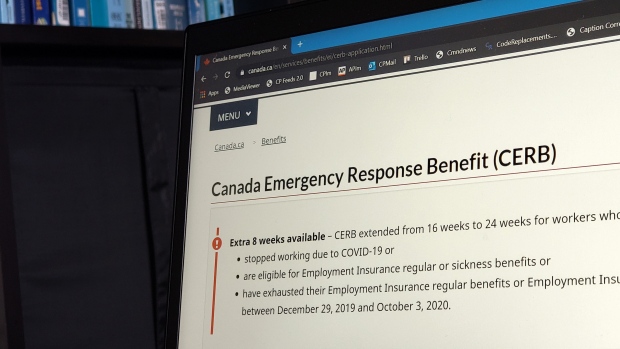
OTTAWA – The Canada Emergency Response Benefit has been a financial livelihood for many, forcing COVID-19 businesses to shut down and shut down the economy in the spring.
$ 500-checks a week have helped millions of Canadians continue to pay their bills and buy groceries, but many have not thought about how the benefit will affect their taxes.
As 2020 draws to a close, tax experts say it’s time to check if you have to pay any income tax on the emergency benefit money you received this year, or face the unpleasant surprise tax time.
John Waters, director of tax consulting services at BMO Private Wealth, said it was important for people to understand that CERB payments should be included in your taxable income.
“The critical thing here is, what is your marginal tax rate and what other sources of income do you have and it dictates what tax to pay,” Waters said.
CERB is designed to help those who have lost their jobs, become ill, or have been forced to stay at home or to look after children.
If you receive CERB benefits, the government will issue you a tax slip detailing the amount you will need to include as income for your 2020 tax return.
The plan pays a maximum of $ 500 per week, up to 000 14,000 for 28 weeks. The amount you receive is considered taxable income, but Ottawa does not deduct any tax when they send that money to Canadians.
Federal Basic Personal Total – The amount you can earn before paying federal income tax – by 2020, 13,229.
Waters means you get the maximum CERB benefit and if you do not have other income and other tax credits, you will have to pay a small amount to Ottawa.
“The main thing is to have a sort of pro pharma or assessment of your tax situation for 2020 … and get a ball park idea of what kind of tax you should pay based on all the sources of income you have. Got and may have some deductions or credits,” he said. .
Waters said it would be good to look back to see if you are eligible for all the CERB payments you have received.
Jamie Golombek, managing director of tax and estate planning with CIBC, said it depends on how much other income you earn this year before or after you receive CERB payments and what other deductions and tax credits you may have.
“If you have any other income in January, February or early March or you came back to work or worked part time or you have some income, you have to pay some money,” he said.
Golombek says it’s good to know now that you have time to put the cash aside rather than scrambling in April when your tax return is due.
“Now you have a better understanding of where you end up,” he said.
“If you’re low, it’s time to spend an extra $ 25, $ 30, $ 40 a week to be able to pay those taxes by next spring.”
Golombek noted that the government was suspending taxes on new utility programs that replaced the CERB program this fall, but that may not be enough either.
“Discontinuing these is only 10 percent, and again it may not be enough for most Canadians, so they may want to plan for it, so it’s not surprising,” he said.
This report of the Canadian Press was first published on November 26, 2020.





More Stories
Sportswear: Lolle acquires Louis Garneau Sports
REM is still innovative enough to foot the bill
A trip to the restaurant with no regrets for these customers